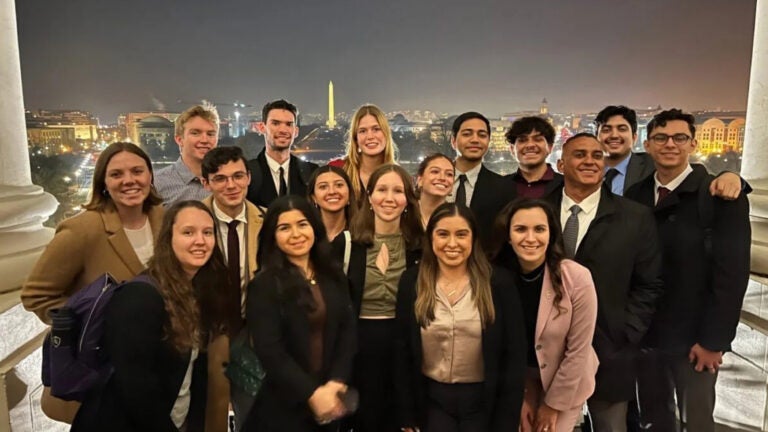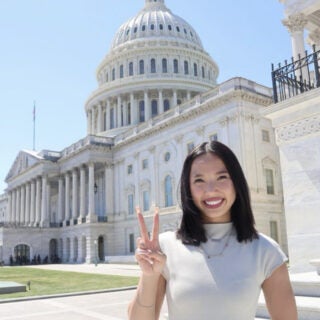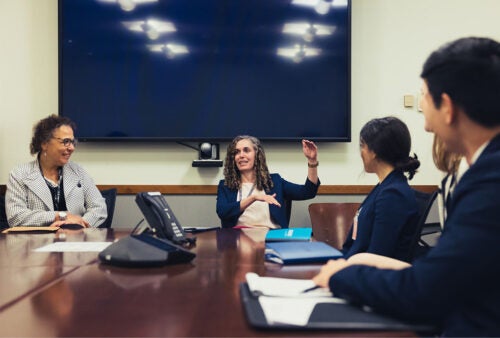
Students meet Washington insiders and connect theory with practice in the nation’s capital
In the heart of America’s capital, where the decisions that shape our nation and the world are made, a unique academic endeavor is bringing students at the USC Dornsife College of Letters, Arts and Sciences into the epicenter of political life.
Last spring, USC Dornsife senior and political science major Alex Kavaldjiev and his classmates gathered at the National Counterterrorism Center with center Director Christine Abizaid and Executive Director Celia Durall to learn about the center’s mission of protecting our nation from terrorism. Just weeks before, Kavaldjiev had played the role of a National Security Council advisor in a class-wide simulation to understand the complex threats facing the United States.
At the Pentagon, Isobel Smith, a senior majoring in international relations and public diplomacy, and her peers met with Deputy Press Secretary and USC Dornsife alumna Sabrina Singh ’09 to discuss matters of U.S. foreign policy, giving real-world context to knowledge she gleaned from textbooks.
Meanwhile, junior Elizabeth Chen, a public policy major, took a tour of the White House underground, enjoying a night of bowling with fellow students at the famous Truman Bowling Alley.

These activities were just a few of the ways students bridged theory with practice through the USC Dornsife Washington DC Program, an immersive, semester-long opportunity to study and work in the nation’s capital.
The program is more than an academic venture; it thrusts students into the dynamic whirlwind of our nation’s decision-making process, where they don’t just learn about policy — they live it.
In a city teeming with history, students take courses drawn from areas with direct policy relevance, such as foreign affairs, the political process and national security, learning directly from practitioners who are experts in their respective fields and hold extensive experience.
“I have never been surrounded by so many people who are passionate about the same policies as I am,” says Chen. “Within the cohort, at work or even at the grocery store, I always found myself interacting with brilliant people who never failed to teach me something new.”
Lawyer Markham Erickson has spent most of his professional career in Washington, D.C., in private practice representing internet, media and telecommunications companies in regulatory and policy matters and doing pro bono work in criminal justice. He knows firsthand how fresh perspectives can invigorate policy work.
An advocate for innovative policy solutions, Erickson knew he wanted to support a USC program that inspired students to recognize their own power in shaping our systems of government. Donating to the Dornsife in Washington DC Program was a clear opportunity to do just that.
“It’s great to have students come out to our nation’s capital, to get involved in public service and to see our government at work,” he says.
Though he recently moved to a policy role at Google, his affinity for Washington drives his support for the program, which he sees as a powerful recruiting tool for careers in the capital.
“Our federal government is only as good as the people who work there,” he says. “We need talented, smart and motivated young people to work in government, and USC has some of the best and brightest students in the world.”
Experiential learning in the capital
Outside the classroom, internships and co-curricular programming bring students face-to-face with the most influential people in the world. Speakers series, professional development workshops and visits to area attractions and institutions round out lectures with practical learning.
“It’s hands-on experiences from left to right, whether it’s at my internship working on programs with congressional appropriators, just walking around the National Mall or doing national security simulations in class,” says Haley Veach, a junior majoring in political science and human security and geospatial intelligence who interned with the Department of Education. “Every moment is a new experience that I’ll never forget.”
Veach, like all of her peers in the Dornsife in Washington DC Program, completed an internship during her time in the capital, working closely with USC Dornsife staff to find a position best suited for her professional goals and ambitions. That meant working with the Department of Education’s Budget Service office to analyze fiscal data from the Rehabilitation Services Administration, with a focus on state grants for disability services.
For senior Terry Wang, who is majoring in international relations with a minor in business law, his internship at the International Trade Administration allowed him to play a role in policymaking on a global scale.

“It’s not every day when you can go to work and be on a first-name basis with a Senate-confirmed official,” he says. “Interning at a federal agency gives you a unique opportunity to work alongside some of the most important policymakers in our country.”
A major draw of the program is the opportunity for students to build their professional networks by meeting with high-profile politicos, some of whom are USC alumni.
In spring 2023, this included a visit with Sens. Corey Booker, Kyrsten Sinema, Joe Manchin and Tim Scott, former Chair of the Joint Chiefs of Staff Adm. Mike Mullen, and then-Speaker of the House Kevin McCarthy. The visit was organized by Dornsife in Washington DC Program co-founder Frank Luntz, an experienced political consultant.
Students also attended mentoring dinners with USC alumni in the area who helped them navigate the complexities of a career in the capital.
“This program teaches you how to capitalize on the renowned Trojan network, which often leads to mentorships and job opportunities,” says Smith, who interned with the U.S. Helsinki Commission during her semester in Washington.
USC Capital Campus: A new hub for Dornsife in Washington DC Program
Announced in March 2023, USC’s new Capital Campus serves as a coast-to-coast bridge for interdisciplinary researchers and policy experts to address national and global challenges in closer collaboration with leading government and academic institutions. The Dornsife in Washington DC Program is the first to occupy the campus.
“Having USC put a flag here in the nation’s capital sends a strong signal to USC students about the value of careers in government,” says Erickson.
The Capital Campus is a USC-owned hub for almost all of the program’s activities, providing a dedicated space for holding classes and hosting guest speakers and panel presentations, as well as serving as a space for networking and public affairs events.
“With the new home, the Dornsife in Washington DC Program’s first initiative will be to expand to include a robust series of summer activities for USC students interning in the nation’s capital,” says Jeffrey Fields, director of the program and professor of the practice of political science and international relations.
Expanding access through giving
For Erickson, supporting the Dornsife in Washington DC Program allows him to invest in the academic and professional journeys of students who will go on to shape our political future.
“Public service is a great way to serve your country and be part of developing solutions that address problems both big and small,” he says. “My hope is that this program will change lives.”
Contributions like Erickson’s make it possible for students with financial need to participate more fully in unique USC Dornsife programming such as that found in Washington.
“Generous giving helped us form the most socioeconomically diverse cohort of students since the inception of the program more than 10 years ago,” says Fields.
These crucial gifts provide scholarship support, funds to defray the costs of unpaid internships and underwriting for activities in the capital that enable scholars to learn about policy firsthand.
“Growing up across the world, I didn’t know much about American politics,” says Smith. “This semester has given me unparalleled insight into the institutions and people who run the country. I can’t recommend this program enough!”